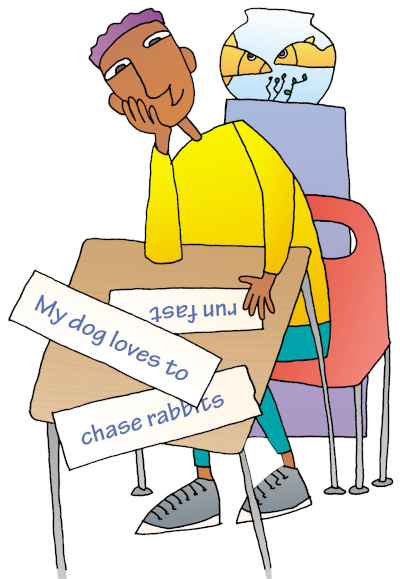Page 81
Combining Sentences

Sentence combining is making one smoother, more detailed sentence out of two or more shorter sentences. For instance, take a look at the following sentences:
- My dog loves to run fast.
- He loves to jump fences.
- He loves to chase rabbits.
These sentences are okay, but all of these ideas can be combined into one smooth-reading sentence, which is even better.
- My dog loves to run fast, jump fences, and chase rabbits.
The guidelines in this chapter will help you learn how to combine sentences, which will help you improve your writing style.
What’s Ahead
WE 082
Page 82
Combining with Key Words
Use a Key Word 🟪 Ideas included in short sentences can be combined by moving a key word from one sentence to the other.
Short Sentences: My dream catcher stopped working. It is dusty.
Combined with an Adjective: My dusty dream catcher stopped working.
Short Sentences: I’ll dust off my dream catcher. I’ll do it tomorrow.
Combined with an Adverb: Tomorrow, I will dust off my dream catcher.
Use a Series of Words or Phrases 🟪 Ideas included in short sentences can be combined into one sentence using a series of words or phrases.
Short Sentences: The cafeteria is loud. The cafeteria is crowded. The cafeteria is hectic.
Combined with a Series of Words: The cafeteria is loud, crowded, and hectic.
All of the words or phrases in a series should be parallel—stated in the same way. Otherwise, the sentence will be unbalanced.)
Incorrect: I will finish my homework, eat my dinner, and a video game.
(Each part in this series should start with a verb.)
Correct: I will finish my homework, eat my dinner, and play a video game.
(Now the series has three actions—finish, eat, and play. The parts are parallel.)
(Now the series has three actions—finish, eat, and play. The parts are parallel.)
WE 083
Page 83
Combining with Phrases
Use Phrases 🟪 Ideas from two or more short sentences can often be combined into one sentence using phrases.
Short Sentences: I found my courage. It was inside my heart.
Combined with Prepositional Phrases I found my courage inside my heart.
Short Sentences: Joe thanked me for my apology. Joe is my best friend.
Combined with an Appositive Phrase: Joe, my best friend, thanked me for my apology.
